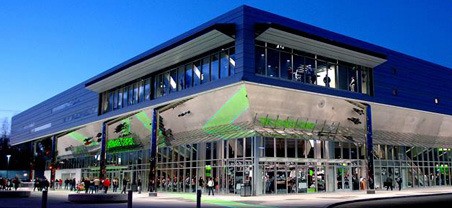Debt seems to be one certainty about Kent’s ShoWare Center but now the City Council must determine whether part of that debt should be considered a loan or a subsidy.
Council members debated for more than an hour at a Tuesday workshop the ramifications to call $18.5 million of city payments to the Public Facilities District (PFD) debt service a loan or a subsidy. The city set up the PFD through the state to help build the $84.5 million city-owned arena.
“It’s a fairly complicated issue,” Council President Dana Ralph said. “The bookkeeping outcome is if it’s a debt it needs to reported as such in our budget and if it’s money that will not be paid back to the city’s general fund then it needs to be reported as such.”
The council couldn’t agree on what to do so the discussion will continue at the council’s Operations Committee meeting at 4 p.m. Tuesday at City Hall. Depending what that committee decides, the issue could go to the full council at its special meeting at 5 p.m. Tuesday when it also votes on the 2015-16 city budget.
A recent state Auditor’s Office preliminary report about the PFD triggered the latest problem with the financially struggling ShoWare Center that has lost more than $3 million since it opened in 2009.
“I look forward to the time when I show up and I say, ‘this is an easy problem and I’ve got seven perfect solutions for you,'” City Finance Director Aaron BeMiller said to the council as he introduced the subsidy vs. loan dispute. “Unfortunately, I don’t think this is one of those times.”
City officials created the PFD in 2007 and issued $63.3 million debt for construction of the arena. The city and PFD signed a loan agreement that stated any city monies contributed toward PFD debt service is a loan to be repaid with interest.
Based on a consultant’s study, city officials assumed the arena and PFD would make enough revenue to cover debt service. But the ShoWare Center lost $480,000 the first year and continues to lose money each year. The district has paid just $4 million toward debt service from a sales tax refund it gets from the state.
“We received an audit finding from the state Auditor’s Office that said you are materially out of compliance and your financial statements are misrepresented,” BeMiller said. “We have a loan payable on the PFD books now but still do not have a loan receivable on our side. We imagine that this will need to change moving forward.
“We are requesting the council to amend the loan agreement which formally changes the city contributions both past and future toward PFD debt service from a loan to a subsidy. We know the PFD can’t generate enough revenue to pay off the debt service let alone to pay us any of the $18.5 million we’ve contributed so far. …Loans made without a reasonable expectation of repayment should not be treated as loans but rather as a subsidy.”
BeMiller later expanded about how the city could get in trouble with the state Auditor’s Office as well as credit rating agencies if no change is made.
“If we book a receivable for $18 million that we don’t believe that we are going to ever get we are not fairly representing the finances of the city and we could get in trouble for that,” he said. “This goes back a little bit to the Enron (an energy company that inflated assets before its collapse in 2001) type. We can’t have contracts out there that say you’re going to pay us $100 million and book that on our assets and say we are flush.”
Several council members still weren’t ready to jump ship about the arena’s ability to make money.
“We thought we would get money back and we’re not getting money back,” Ralph said about the initial projections. “At the end of the day I do not feel that I can say to our residents that we’ve done everything we can and turned over every stone and had every conversation….Maybe there’s options we can do different in the business model. We all have a vested interest in this and now might be the time to take a step back to look at what are our options.”
Councilman Jim Berrios agreed with Ralph that possibly more can be done for the arena to make money.
“This is a very sensitive issue,” Berrios said. “I get the implications here with the auditor and cleaning up the books so to speak. Calling it what it is, is it a loan we can never pay back or maybe pay back some of it and create language to say that …. I feel we need more discussion but eventually we do need to clean up how we word this. I don’t see any signs of paying back the entire thing. But we should leave some hope to pay some of it back.”
Just last month the council agreed to use extra reserve monies in the city’s general fund budget to pay off the ShoWare Center’s operating debt of $2.7 million.
Talk to us
Please share your story tips by emailing editor@kentreporter.com.
To share your opinion for publication, submit a letter through our website https://www.kentreporter.com/submit-letter/. Include your name, address and daytime phone number. (We’ll only publish your name and hometown.) Please keep letters to 300 words or less.

